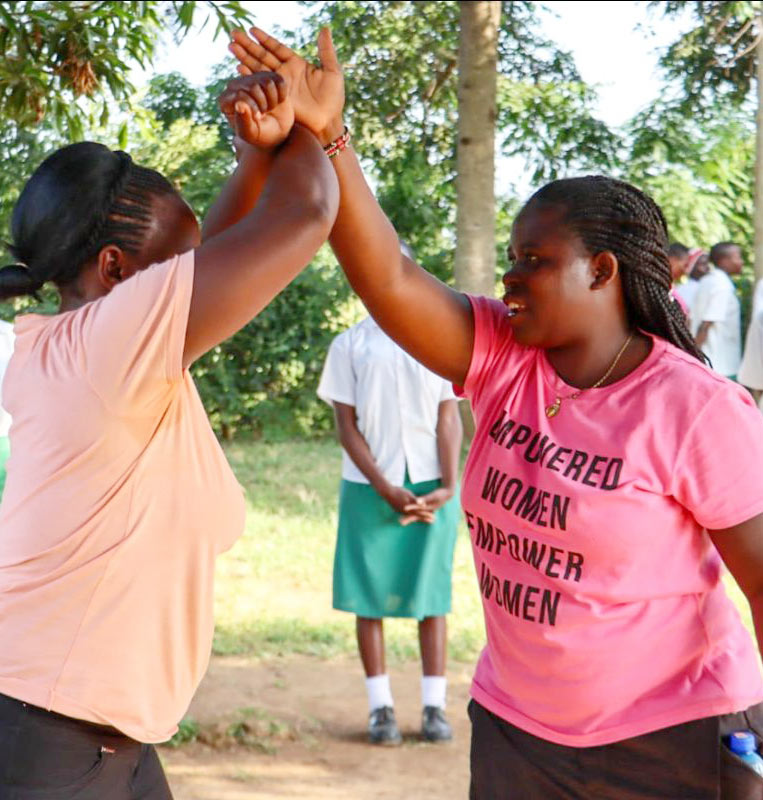Kenyan Women Against Gender-Based Violence
How can 10 days volunteering in Kenya create a ripple effect in a whole rural community, for years to come?
This is exactly what Aminta Steinbach, a senior martial arts student and also co-director of the self defense program at Hand to Hand Kajukenbo did, by teaching self-defense to 40 remarkable Boda Girls. The Boda Girls are then transferring this newly gained knowledge to hundreds of girls in high school, to whom they are mentors.
Watching this process unfold was nothing short of inspiring. I know that several of these Boda Girls have survived physical assaults in their pasts, and have entered a traditional male industry of motorcycle taxis. The impact of Aminta’s training was profound, as I saw the Boda Girls’ assertiveness and confidence soaring within just one day. In a few short days, they were ready to pass on the torch, teaching an hour-long class focused on the principles of Think, Yell, Run, Fight, and Tell to 250 high school girls attending the Lifunga Girls STEM Camp, sponsored by Matibabu College of Health Sciences. This endeavor was made possible through the dedication of teacher Rebecca Girard of Notre Dame High School Belmont and graduate and UCB student, Abiya Baqai.
The Boda Girls took ownership of the self-defense curriculum, weaving their own stories and unique style into the practice sessions. The results were extraordinary, evident in the enthusiastic participation and skill demonstrations by the high school girls. The Boda Girls are now committed to extending their self-defense teaching efforts as they visit schools this year to educate 8th graders about menstrual health, and providing free sustainable menstrual kits from our partners at Days for Girls. Next summer, we aim to expand our reach with self-defense and STEM volunteer teachers, hoping to equip younger girls at the Lifunga feeder schools with valuable skills and knowledge.

But how did self-defense become an integral part of Tiba Foundation’s support for the health of rural communities?
The answer lies in the pressing need to address gender-based violence, a significant challenge reported in Matibabu Foundation’s survey to over 300 community members. Gender-based violence has far-reaching implications, affecting not only physical health, but also mental health, education, livelihoods, and overall community dynamics.
A pivotal moment occurred during a conversation I had with Dorothy Opongo, the Principal of Lifunga Secondary School for Girls, after a presentation on menstrual health. As we observed young women boarding boda bodas (motorcycle taxis) to reach their distant homes, Dorothy explained the dangers these rides posed. Young male taxi drivers had been known to trick or assault young women. This pivotal conversation birthed the Boda Girls Program, a dual-purpose initiative that empowers women through taxi businesses while promoting women’s health, education, and entrepreneurship within the community.

While it’s challenging to quantify the full impact of the Boda Girls on gender-based violence, local law enforcement and tribal elders predict a significant decrease in such cases as more women ride with Boda Girls and students receive self-defense training.
To continue this vital work, we need your support. Please share this newsletter with your community and consider contributing to our project. Healthy women, both in body and soul, are the cornerstone of a thriving community. Join us in extending the reach of the Boda Girls, empowering more women, their families, and communities.
In partnership,
Diane Dodge
Executive Director – Tiba Foundation

